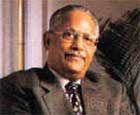 | « Back to article | Print this article |
 It is celebration time for Dr Pratap C Reddy, Chairman, Apollo Group of Hospitals. His baby, Apollo Hospitals Ltd, has just turned 20.
It is celebration time for Dr Pratap C Reddy, Chairman, Apollo Group of Hospitals. His baby, Apollo Hospitals Ltd, has just turned 20.
From the first hospital started in Chennai in 1983 with 150 beds, the hospital group is now the world's third largest private health provider with 6,200 beds.
The Apollo Hospitals group, with a turnover of over $100 million, has a network of 36 hospitals, 46 primary clinics and over 135 pharmacies operating in more than 20 cities in India, in addition to the hospitals in Middle East Asia and Sri Lanka.
A proud Reddy spoke exclusively with Shobha Warrier.
He outlined his plans to make India the global healthcare destination.
Excerpts from the interview:
You talked about India becoming the global healthcare destination. Where is the thrust going to be: attracting patients to India or having more hospitals abroad?
Basically, we are here to take care of the healthcare needs of the people. Apollo and other private hospitals have tried to bring in the best health facilities to India. Now, most of these hospitals are in the metros. We want to take it to the smaller towns and villages.
Similarly, in some of the other countries especially in the Afro-Asian region, there is a great need for healthcare facilities.
For example, people from Sri Lanka, Bangladesh and other SAARC (South Asian Association for Regional Co-operation) countries have been coming to India for treatment for a long time. They are satisfied with the quality of care they are getting from Apollo.
We expect people from other countries -- especially from the African and Middle East countries -- also to come to India for their healthcare needs.
In Afro-Asian countries alone, the overseas spending for healthcare is $17 billion.
I think we should tap that. We should make sure that a majority of that money comes to India. We offer the best care, and our cost is only a fraction of what it is in the developed countries.
I was asking you about Apollo starting hospitals in those places. . .
We are going to upgrade some of our facilities. In Africa, we feel we should have at least a secondary care hospital. So, we will tie up with somebody there.
We will have information centres there to let people know what is available in India, what they can expect and what the cost is, and also to assist them to come to the right centres.
So, our thrust is to make India the healthcare destination of the world. We are confident we can bring the world to Apollo.
We have to bring them to India because we can't give tertiary care of this standard in other countries. That is because we need an entire gamut of services in tertiary care.
We want to tell the world that our specialists have performed over 500,000 major surgeries and over a million other surgical procedures including cardio-thoracic, neurological, cancer, etc with success rates on par with international standards.
Our success rate in the 43,000 cardiac surgeries we have done is 98.5 per cent. Our success in the 110 bone marrow transplants is 80 per cent. Our success rate in the 6,000 renal transplants is 95 per cent.
How much do you expect the healthcare sector in India to grow?
The numbers game is a very difficult one. Like I told you, $17 billion is the overseas spending on healthcare from the Afro-Asian countries alone.
Similarly, medical business process outsourcing is almost a $100 billion industry.
So, the question is, how much can we take? It is essential for us to build our strengths to try and get that market.
What about medi-tourism?
When India becomes the healthcare destination of the world, health tourism also will grow accordingly. All the other industries related to healthcare also would grow with healthcare.
I must add we are the key players responsible for the emergence of medi-tourism in India.
You have said India should not lose its inherent potential as far as healthcare is concerned. To achieve that you planned to have a test module in Goa where the best from the East would meet the best from the West, and it would offer a holistic approach to healthcare. Can you elaborate?
West means technology, and adaptation in delivering healthcare. Here, we have our traditional medicines like Ayurveda, Homeopathy, Unani. . . We are also reversing the aging process and de-stressing people through yoga and meditation.
We plan to put all this in a package and bundle it and offer to the world.
When everything is finalised, I will give you all the details.
You have floated an insurance scheme for NRIs. . .
When we opened our hospital in Ahmedabad, we got a lot of messages from Non-Resident Indians who were so impressed with the facilities that we offered.
They asked us whether they also could make use of the facilities and how much it would cost them. They also wanted to know whether there was any scheme for them.
That is why we decided to have the NRI insurance scheme.
First, we thought of going through the insurance companies but we found that the insurance companies couldn't do it.
So, we are floating this $400 yearly insurance scheme ourselves. The specification is that it has to be a group policy, and not for individuals.
For example, it is like the Gujarati community in the African countries or in the United States or in London taking it as a package. The $400 yearly insurance would cover treatment cost at any of the Apollo hospitals facilities, together with the travel to the hospital.